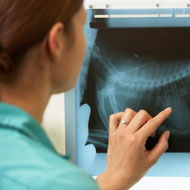Under the new 'graded approach', radiation employers will need to notify, register or get consent, depending on the level of risk involved in their work.
Practices will be required to register with HSE
Veterinary practices using diagnostic radiography will need to register with the Health and Safety Executive (HSE), under new regulations coming into force from 1 January, 2018.
Those with multiple sites will only need to register once. Some sites may also be required obtain consent.
The Ionising Radiation Regulations 2017 (IRR17) are set to replace existing regulations (IRR99), which may impact the way veterinary practices work.
Some of the changes include*:
- how you tell HSE that you work with ionising radiation
- the dose limit for exposure to the lens of the eye - from 150mSv to 20mSv in a year
- a requirement to put in place procedures to estimate doses to members of the public
- recording and analysis of significant events, i.e radiation accidents
- removing the subsidiary dose limit for the abdomen of a woman of reproductive capacity.
* List not necessarily exhaustive
Under the new 'graded approach', radiation employers - which will now be referred to as 'employers' - will need to notify, register or get consent, depending on the level of risk involved in their work.
Ionising radiation occurs as either electromagnetic rays (such as X-rays and gamma rays), or particles (such as alpha and beta particles). It occurs naturally, e.g. radon gas, but can also be produced artificially.
Veterinary practices are advised to contact their radiation protection adviser (RPA) for advice on how the new regulations may affect them. Further information can be found on: www.hse.gov.uk/radiation/ionising







 The BSAVA has opened submissions for the BSAVA Clinical Research Abstracts 2026.
The BSAVA has opened submissions for the BSAVA Clinical Research Abstracts 2026.
